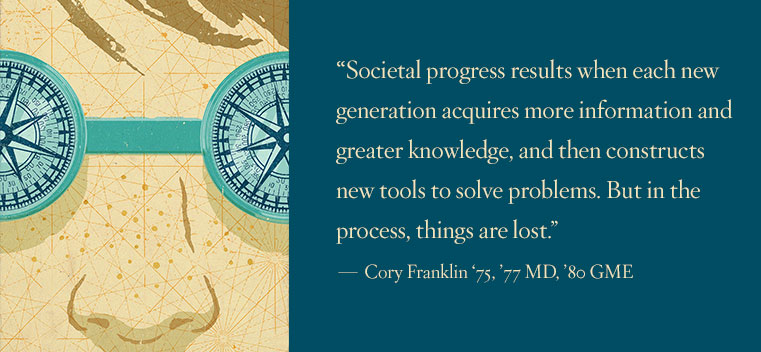
Navigate by the Stars
Cory Franklin ‘75, ’77 MD, ’80 GME of Wilmette, Ill., was director of medical intensive care at Cook County Hospital (now John H. Stroger Jr. Hospital) for 25 years. Franklin’s book Cook County ICU: 30 Years of Unforgettable Patients and Odd Cases (Chicago Review Press) was published last fall.
Tell us what you think. E-mail comments or questions to the editors at letters@northwestern.edu.
Find Us on Social Media
Technology should complement — not replace — old-school skills
Because of fears that the Global Positioning System could be jammed or hacked, the U.S. Navy has announced it will reinstitute classes on celestial navigation, i.e. plotting course and direction by the stars. “We went away from celestial navigation because computers are great,” Lt. Cmdr. Ryan Rogers, deputy chairman of the Naval Academy’s department of seamanship and navigation, recently told the Capital Gazette. “The problem is there’s no backup [for GPS].”
The Navy will complement the more precise — but potentially vulnerable — GPS by teaching the navigation method mariners have employed since antiquity. The New York Times reports that Russian submarines are trolling ominously close to critical undersea communication cables from the North Sea to waters near U.S. shores, so this development represents a teachable moment about overreliance on technology.
If you’ve ever driven in a strange city or isolated area, you may be familiar with overdependence on technology. GPS is an invaluable tool that usually directs you reliably to your destination. But occasionally GPS will not tell you about detours and road construction or what the shortest route is. It may misidentify your destination and take you miles out of your way. So the value and reliability of GPS are enhanced by having a traditional paper map, the ability to read the map, and directions from local residents.
Societal progress results when each new generation acquires more information and greater knowledge, and then constructs new tools to solve problems. But in the process, things are lost. So while knowledge increases in our modern society, fewer people know how to bake a cake from scratch, build a campfire or read a map.
Of course, those skills no longer have much use, and if you really want to bake a cake, you can always Google it. But the computer also creates a loss of knowledge, and the loss has been especially dramatic in skills acquired in childhood, such as cursive writing and spelling.
Another skill that is threatened is computational ability. Give a third-grader a calculator to solve a list of math problems, and even with poor math skills, he or she will likely obtain the right answer for most problems. But the child will get some wrong, a few by a large margin. And without a math background, the child won’t realize how bad their errors are: 12 x 10 is not 1,200. This matters and eventually becomes a more serious problem than just a generation that can’t make change for a $20 purchase.
Medicine confronted a similar issue of technology versus experience in the 1980s. When CT scans were introduced, the technology facilitated making diagnoses that formerly required long hospital stays, dangerous procedures or surgery. Today, physicians routinely — sometimes too routinely — order CT scans as part of their immediate diagnostic plan. This approach often results in an immediate diagnosis, albeit at a cost: New doctors fail to learn important skills, including how to take a history and examine a patient. If the CT scan does not, or cannot, provide the answer, the physicians are stymied.
The story of the CT scan provides a historical lesson about technology versus experience. When the first CT scans displayed images of the brain, some doctors predicted the technology would make neurologists obsolete. Others argued the opposite — the CT scan would never match an experienced neurologist doing a detailed history and physical.
Ultimately, neither prediction proved true. CT scans revolutionized medicine and made all doctors better diagnosticians. The test did not make neurologists obsolete; good neurologists who knew how to interpret the test became even more valuable. It demonstrated that experience plus technology is superior to either one alone.
Today, the challenge to the Navy presented by GPS is similar to the one that medicine faced. Today’s GPS is amazingly accurate, but guidance by the stars remains a necessary complementary technology. Capt. Timothy Tisch of the U.S. Merchant Marine Academy told the Telegraph, “Knowledge of celestial navigation in the GPS era provides a solid backup form of navigation in the event GPS becomes unreliable for whatever reason. It is also a good professional practice to use one navigational system to verify the accuracy of another.”
This is a reminder that technology is invaluable for navigation, medical diagnosis and teaching children math and verbal skills. Without human experience, however, GPS, CT scans and tablets will never be sufficient to guarantee our future.



 Facebook
Facebook Twitter
Twitter Email
Email


